 In July of 2011, just days after the massacre of 77 mostly children at a youth summer camp by a Rightwing extremist in Norway, Brian Levin, the Director of the Center for the Study of Hate and Extremism at California State University interviewed Daryl Johnson, formerly of the Dept. of Homeland Security (DHS).
In July of 2011, just days after the massacre of 77 mostly children at a youth summer camp by a Rightwing extremist in Norway, Brian Levin, the Director of the Center for the Study of Hate and Extremism at California State University interviewed Daryl Johnson, formerly of the Dept. of Homeland Security (DHS).
Johnson was the agency's senior domestic terrorism analyst from 2004 to 2010. He was also the lead author of DHS' April 2009 draft report --- which was, shortly thereafter, retracted under pressure from Republicans, rightwingers and some veterans groups --- entitled "Rightwing Extremism: Current Economic and Political Climate Fueling Resurgence in Radicalization and Recruitment" [PDF].
After the public outcry from the Rightwing victimization industry, the DHS shamefully apologized for working on the report at all, even though it was begun during the Bush Administration; was being produced in response to a mandate from Congress; followed a DHS report on Leftwing extremism [PDF] (which received no similar outraged protestations) in January of 2009; and was authored by Johnson, who describes himself in the interview below as a pro-life, pro-gun, conservative Republican Mormon.
The draft 9-page DHS report had cautioned about the re-emergence of potentially violent extremist groups "that are mainly antigovernment, rejecting federal authority in favor of state or local authority, or rejecting government authority entirely."
It warned that similar conditions to those in the 1990's (an economic recession, a Democrat in the White House) which had led to, among other domestic terrorist incidents, the 1995 bombing of the Alfred P. Murrah federal building in Oklahoma City, had brought about a "growth in the number of domestic rightwing terrorist and extremist groups and an increase in violent acts targeting government facilities, law enforcement officers, banks, and infrastructure sectors."
The report cautioned that "lone wolves and small terrorist cells embracing violent rightwing extremist ideology are the most dangerous domestic terrorism threat in the United States" and concluded that "rightwing extremism is likely to grow in strength."
Following the deadly attack on two police offers and another person on Sunday in Las Vegas, allegedly carried out by two married members who self-identified as part of the so-called "Liberty Movement" and who appeared at the Nevada ranch of Cliven Bundy during the recent armed protest against the federal government with others in the movement, it seems a good moment to revisit that 2011 interview with the lead author of that retracted DHS report.
The alleged killers in the tragedy over the weekend later killed themselves. They reportedly draped the dead bodies of the two cops they shot with the Gadsden ("Don't Tread on Me") flag, popular with those in the "Tea Party" and "Liberty" movements, and were said to have kept Swastikas and other Nazi memorabilia in their apartment.
Neighbors told reporters that the two "had a reputation for spouting racist, anti-government views, bragging about their gun collection and boasting that they’d spent time at Cliven Bundy’s ranch during a recent standoff there between armed militia members and federal government agents."
In other words, the warnings of Johnson, both in the retracted 2009 DHS report and in his 2011 interview, seem extraordinarily prescient today, for some odd reason.
Here are extended excerpts, some of them chilling in retrospect, from that 2011 interview of Daryl Johnson by Brian Levin...
No. My team and I analyzed the entire spectrum of extremist movements within the United States. Our work was all about identifying extremist threats, understanding the radicalization process and informing law enforcement of emerging extremist trends in the U.S.
Do you have any political antagonism towards conservatives, military veterans or religious people?
Absolutely not. I am a conservative. I'm married, have children and am a lifetime third generation registered Republican. I have military veterans in my extended family. I'm also a Mormon. I respect people of all faiths. I feel so strongly about our religious freedoms, that I served two years as a missionary for my church.
Would you consider yourself prolife?
Yes. I believe in the sanctity of life including the preborn.
Do you support a broad right to individual gun ownership by competent non-felons?
Yes, I am a gun owner myself and enjoy target shooting and experienced game hunting in my youth.
Do you support a limited federal government and broad autonomy for states?
Yes, but I believe there is an important role for federal law enforcement.
Under which administration was this research actually started?
The research for this report began in 2008 under the Bush Administration.
What do you say to people that said your report was a political "hit job" against conservatives?
The report was not politically motivated. It was researched over a long time period, but put together in a relatively short period of time. Hence, some of the language could have been better worded. But I stand by its core analytical judgments. I regret that so many people took things out of context, mischaracterized the report and used it to orchestrate political attacks against President Obama and his administration.
...
Why interview now?
Obviously, I couldn't discuss this with the media while employed at DHS. It took me a year after leaving to finally decide that this was truly the right thing to do. I also wanted to give DHS adequate time to determine whether or not it wanted to reconstitute the domestic non-Islamic terrorism effort. It never did.
Since Obama took office, there have been nearly twenty extremist rightwing attacks and plots, including the killing of almost a dozen police officers in six separate attacks. There have also been militia plots in places like Alaska and Michigan that targeted government officials such as a judge and police. Package bombs were mailed in the DC area. In recent months we had three sovereign citizen related shootings in Florida, Arizona and Texas. [Ed Note: Remember, this interview took place in July 2011, there have been many more such attacks since, including the weekend shooting in Las Vegas.]
How many people worked on your team?
Six worked directly for me with two others in support roles.
How many analysts at DHS worked Muslim extremism issues?
In 2008, there were close to 40. A year later that number had decreased to around 25. There were additional analysts working other topics such as critical infrastructure, border security and weapons of mass destruction.
How does the threat from radical Muslim extremists in the U.S. compare with that of right wing domestic extremists?
During the past 10 years there have been five successful attacks in the U.S. by Muslim extremists, but in the last three years there have been 20 attacks attributed to domestic right wing extremists and the number of fatalities is about equal between the two. There were more firearms possessed by the Hutaree [an alleged extremist] militia than by all 200 of the Muslim extremists arrested in the U.S. since 9/11.
...
How did your analytic team differ from other agencies covering the same topic?
Our mission was to identify potential terrorists, assess their level of threat and notify law enforcement when we noticed something of concern. We looked at extremists who embraced belief systems that were known for advocating violence and criminal activity, but may not necessarily be currently engaging in such activity. We were responsible for understanding the radicalization process - how someone evolves from a peaceful, law-abiding person to an individual who commits crime or acts of violence. We also provided an alternate voice to the FBI. It is very important to have alternate voices weighing in on issues of interest within the intelligence community. That way, the intelligence community doesn't get caught up in "group think" or inaccurate judgments. That voice is no longer there.
...
Who criticized the report?
The report had upset many conservatives and veterans organizations. Some believed it was a deliberate attack on their beliefs and way of life.
You received criticism about returning military veterans, was it deserved?
I honor and respect our nation's veterans. They are sacrificing their time, talents and lives each and every day to keep our country safe and secure. For that, I am extremely grateful. I have family members who served in the military. That said, unfortunately there are those who would prey upon our military veterans and attempt to recruit them into joining extremist causes such as white supremacist groups, militias and the sovereign citizen movement.
...
What happened at DHS as a result of the criticism?
My team was dissolved. All training courses and briefings presentations were stopped. DHS leaders made it increasingly difficult to release another report on this topic.
Why would DHS leaders dissolve your team and stop these analytic activities?
The subject had become too politically charged. As a result, DHS leaders adopted a risk adverse approach toward this issue. Perhaps they thought it was a matter of organizational preservation.
Do you think the dissolution of your unit that you discuss has negatively affected state and local law enforcement?
Certainly. There is one less agency to assist state and local law enforcement with this growing and dangerous problem at a time of heightened activity.
Why did you leave DHS?
I could no longer effectively do my job. New processes made it increasingly difficult to get any work accomplished.
Have the conditions which affected your conclusions changed since the report was issued?
No. The factors have remained the same - the economy remains sluggish and uncertain; unemployment hovers around 10 percent nationally; Obama is still President; and the 2010 Census results show a changing demographic in America shifting away from a predominantly Caucasian nation.
Has the leak had a chilling effect on the analyst community?
Within the intelligence community at-large, I don't think so. Inside the Department of Homeland Security, I believe it did. Other DHS analysts saw what happened to us - saw leadership backing away from supporting the report and those responsible for writing it. Many left the agency as a result.
Was a revised version of the report ever disseminated as promised?
There was an attempt to rewrite the report that basically removed some of the controversial language such as the definition, the terms "rightwing" and "disgruntled veteran". Nevertheless, all of the main points, primary themes and analysis remained the same. It was never disseminated.
Why was your work important? Do any other agencies replicate what you were doing?
My unit at DHS was unique in that we conducted trend analysis of domestic non-Islamic extremism in the United States. We were also congressionally mandated by statute to study the radicalization phenomena. We were the only analytical unit in the intelligence community doing this type of work from a purely domestic non-Islamic perspective.
How does the attack in Norway affect us?
It should be a "wake up call" for our nation's leaders. From a U.S. government perspective, our leaders are not really concerned about this issue. They appear to be downplaying or outright dismissing the threat from domestic non-Islamic extremists. There is an overall lack of adequate resources at the local, state and Federal level to effectively analyze and assess the vast number of domestic extremists who are likely on the verge of violence in this country. We are vulnerable to a Norway-style of attack - lone extremists using small arms and improvised explosives to carry out devastating attacks with little effort or formalized terrorist training. It should also give pause to those who are engaging in overly heated political rhetoric for personal gain.
In August of 2012, writing at Salon, Johnson once again reminded us how he tried to warn about RW extremists, only to be undone by the politicization of his report. His article, posted just after the shooting by a Rightwing extremist at a Sikh Temple in Wisconsin resulted in the deaths of six worshippers, updated the death toll at the time...
In January 2010, a tax resister deliberately crashed his small plane filled with a 50-gallon drum of gasoline into an IRS processing center in Austin, Texas; in January 2011, three incendiary bombs were mailed to government officials in Annapolis, Md., and Washington, D.C.; also, in January 2011, a backpack bomb was placed along a Martin Luther King Day parade route in Spokane, Wash.; and, during 2010-2012, there have been multiple plots to kill ethnic minorities, police and other government officials by militia extremists and white supremacists.
The Sikh temple shooting in Oak Creek, Wis., and the shooting of four sheriff’s deputies in St. Johns Parish, La., in August are only the latest manifestations of right-wing extremist violence in the U.S. Yet, there have been no hearings on Capitol Hill about this issue. DHS still has only one analyst monitoring domestic terrorism. The federal government’s failure to recognize the domestic terrorism threat tells me there will assuredly be more attacks to come.
"More attacks to come", indeed. Johnson has been right all along. Those who politicized his warnings in a pathetic effort to put damaging the Obama Administration ahead of keeping fellow citizens safe from a clearly growing menace, continue to disgrace and harm this nation.
CORRECTION: We originally described Johnson as "pro-choice" in the early part of the story. That was a mistake and has been corrected above.


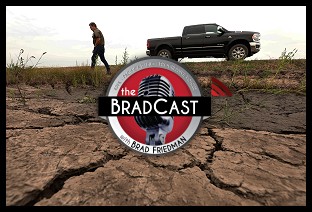 Trump is Bad for Business... and Farmers... and National Parks... and...:
Trump is Bad for Business... and Farmers... and National Parks... and...: 'Green News Report' 3/4/25
'Green News Report' 3/4/25
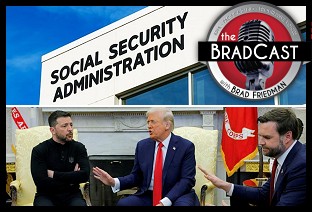 Trump Targeting 50% Cuts, Field Office Closures at Social Security: 'BradCast' 3/3/25
Trump Targeting 50% Cuts, Field Office Closures at Social Security: 'BradCast' 3/3/25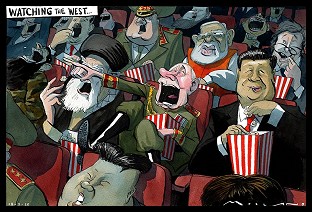 Sunday 'Dumbest Show on Earth' Toons
Sunday 'Dumbest Show on Earth' Toons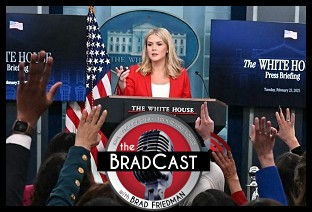 Defending the Free Press Against the White House (and Jeff Bezos): 'BradCast' 2/27/25
Defending the Free Press Against the White House (and Jeff Bezos): 'BradCast' 2/27/25 'Green News Report' 2/27/25
'Green News Report' 2/27/25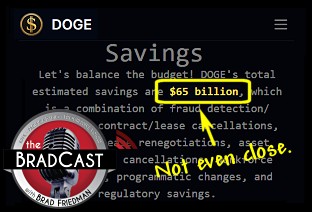 The Ongoing Waste, Fraud and Abuse by Trump, Musk & DOGE: 'BradCast' 2/26/25
The Ongoing Waste, Fraud and Abuse by Trump, Musk & DOGE: 'BradCast' 2/26/25 A Bad Day for Elon Musk is a Good Day for America (& the World): 'BradCast' 2/25/25
A Bad Day for Elon Musk is a Good Day for America (& the World): 'BradCast' 2/25/25 'Green News Report' 2/25/25
'Green News Report' 2/25/25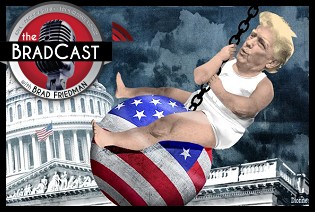 Seriously, Why Does Trump Want to Destroy the Federal Govt?: 'BradCast' 2/24/25
Seriously, Why Does Trump Want to Destroy the Federal Govt?: 'BradCast' 2/24/25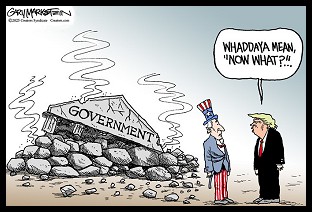 Sunday 'Now What?' Toons
Sunday 'Now What?' Toons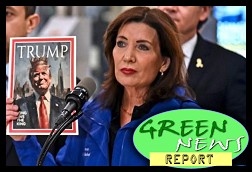 'Green News Report' 2/20/25
'Green News Report' 2/20/25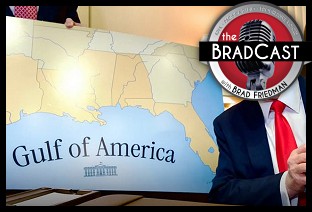 Why Trump's 'Gulf of America' Order May Be Worth Fighting: 'BradCast' 2/20/25
Why Trump's 'Gulf of America' Order May Be Worth Fighting: 'BradCast' 2/20/25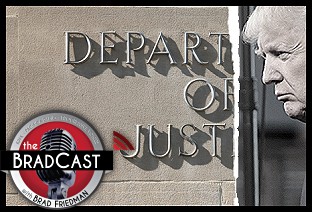 Former Federal Prosecutor on Trump's Weaponization of DoJ: 'BradCast' 2/19/25
Former Federal Prosecutor on Trump's Weaponization of DoJ: 'BradCast' 2/19/25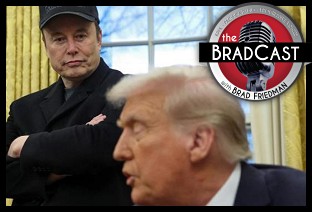 Trump/Musk Gutting of Government Continues: 'BradCast' 2/18/25
Trump/Musk Gutting of Government Continues: 'BradCast' 2/18/25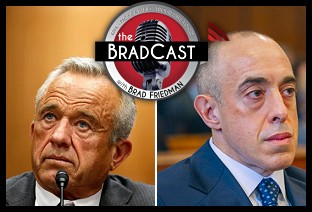 RFK, Jr. Confirmed for HHS; Also: DOJ's Thur. Afternoon Massacre: 'BradCast' 2/13/25
RFK, Jr. Confirmed for HHS; Also: DOJ's Thur. Afternoon Massacre: 'BradCast' 2/13/25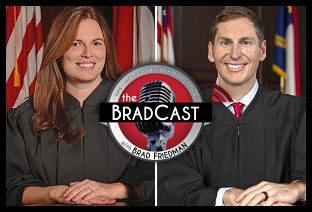 2024's Last Unsettled Race: 'BradCast' 2/12/25
2024's Last Unsettled Race: 'BradCast' 2/12/25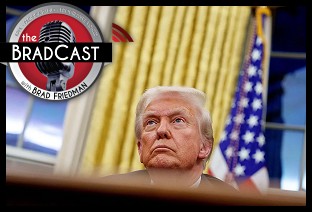 'Very Dire': Ethics Expert on Trump's Corruption: 'BradCast' 2/11/25
'Very Dire': Ethics Expert on Trump's Corruption: 'BradCast' 2/11/25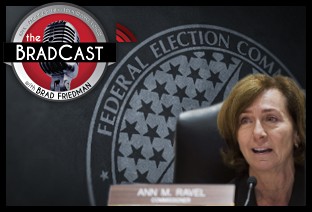 'Insane': Former FEC Chair on Trump's Firing of Current FEC Chair: 'BradCast' 2/10/25
'Insane': Former FEC Chair on Trump's Firing of Current FEC Chair: 'BradCast' 2/10/25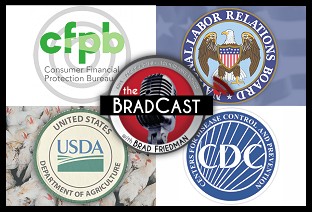 Trump/Musk 'Shutdowns' You Haven't Heard as Much About: 'BradCast' 2/6/25
Trump/Musk 'Shutdowns' You Haven't Heard as Much About: 'BradCast' 2/6/25
 VA GOP VOTER REG FRAUDSTER OFF HOOK
VA GOP VOTER REG FRAUDSTER OFF HOOK Criminal GOP Voter Registration Fraud Probe Expanding in VA
Criminal GOP Voter Registration Fraud Probe Expanding in VA DOJ PROBE SOUGHT AFTER VA ARREST
DOJ PROBE SOUGHT AFTER VA ARREST Arrest in VA: GOP Voter Reg Scandal Widens
Arrest in VA: GOP Voter Reg Scandal Widens ALL TOGETHER: ROVE, SPROUL, KOCHS, RNC
ALL TOGETHER: ROVE, SPROUL, KOCHS, RNC LATimes: RNC's 'Fired' Sproul Working for Repubs in 'as Many as 30 States'
LATimes: RNC's 'Fired' Sproul Working for Repubs in 'as Many as 30 States' 'Fired' Sproul Group 'Cloned', Still Working for Republicans in At Least 10 States
'Fired' Sproul Group 'Cloned', Still Working for Republicans in At Least 10 States FINALLY: FOX ON GOP REG FRAUD SCANDAL
FINALLY: FOX ON GOP REG FRAUD SCANDAL COLORADO FOLLOWS FLORIDA WITH GOP CRIMINAL INVESTIGATION
COLORADO FOLLOWS FLORIDA WITH GOP CRIMINAL INVESTIGATION CRIMINAL PROBE LAUNCHED INTO GOP VOTER REGISTRATION FRAUD SCANDAL IN FL
CRIMINAL PROBE LAUNCHED INTO GOP VOTER REGISTRATION FRAUD SCANDAL IN FL Brad Breaks PA Photo ID & GOP Registration Fraud Scandal News on Hartmann TV
Brad Breaks PA Photo ID & GOP Registration Fraud Scandal News on Hartmann TV  CAUGHT ON TAPE: COORDINATED NATIONWIDE GOP VOTER REG SCAM
CAUGHT ON TAPE: COORDINATED NATIONWIDE GOP VOTER REG SCAM CRIMINAL ELECTION FRAUD COMPLAINT FILED AGAINST GOP 'FRAUD' FIRM
CRIMINAL ELECTION FRAUD COMPLAINT FILED AGAINST GOP 'FRAUD' FIRM RICK SCOTT GETS ROLLED IN GOP REGISTRATION FRAUD SCANDAL
RICK SCOTT GETS ROLLED IN GOP REGISTRATION FRAUD SCANDAL VIDEO: Brad Breaks GOP Reg Fraud Scandal on Hartmann TV
VIDEO: Brad Breaks GOP Reg Fraud Scandal on Hartmann TV RNC FIRES NATIONAL VOTER REGISTRATION FIRM FOR FRAUD
RNC FIRES NATIONAL VOTER REGISTRATION FIRM FOR FRAUD EXCLUSIVE: Intvw w/ FL Official Who First Discovered GOP Reg Fraud
EXCLUSIVE: Intvw w/ FL Official Who First Discovered GOP Reg Fraud GOP REGISTRATION FRAUD FOUND IN FL
GOP REGISTRATION FRAUD FOUND IN FL


































